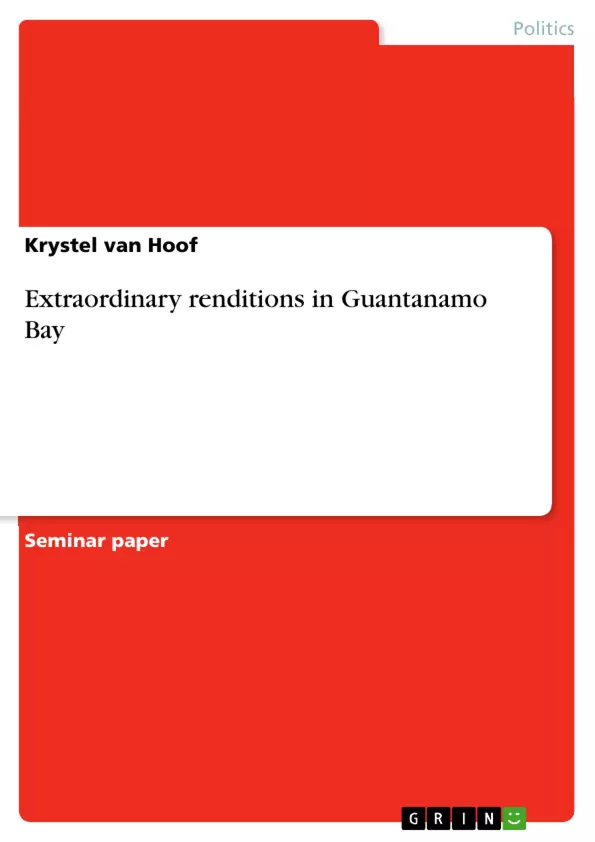According to the constructivits' point of view, states would tend to avoid behaving in ways that are legally unjustifiable. However, this theory does not seem to be internationally respected. The most striking example would be the United States, commonly known as a law-breaker, law-avoider and law-defector. Its law-breaker position can be, for instance, very well illustrated by the Guantanamo Bay issue, which has ineradicably become synonymous with torture. Indeed, this subject has caused much controversy and debates are still straddling. It became the centre of international attention in 2002 when horrible images and video recordings showing the most degrading forms of abuse commited at the Guantanamo Bay detention camp in Cuba were diffused by the media and spread across the entire world.
Why? The Bush administration had decided after the 9/11 attacks that the Geneva Conventions of 1949 would not apply to the Taliban and al-Qaeda. Instead, the latter were (even) deprived of the basic human living conditions.
What about the Obama administration today? Has the situation improved after the president announced his intention to close Guantanamo? Which consequences would the closure give way to? What happens to the detainees? This paper will deal with the evolution of the Guantanamo Bay issue from the Bush administration until the current Obama presidency.
Inhaltsverzeichnis (Table of Contents)
- Extraordinary renditions in Guantanamo Bay
- The Geneva Conventions
- The Bush Administration's Detention Rules
- The Obama Administration's Approach
- The Case of Salid Ahmed Hamdan
- The Moral and Legal Implications of Guantanamo
Zielsetzung und Themenschwerpunkte (Objectives and Key Themes)
This paper aims to examine the evolution of the Guantanamo Bay issue from the Bush administration to the current Obama presidency. It focuses on the legal and moral implications of the United States' detention policies, particularly in relation to the Geneva Conventions.
- The application of the Geneva Conventions to terrorist suspects
- The use of torture and harsh interrogation techniques
- The legality and effectiveness of military commissions
- The ethical and political ramifications of indefinite detention
- The efforts to close Guantanamo Bay and reform detention practices
Zusammenfassung der Kapitel (Chapter Summaries)
- Extraordinary renditions in Guantanamo Bay: The paper introduces the Guantanamo Bay issue and its historical context, emphasizing the controversy surrounding the use of torture and the violation of human rights.
- The Geneva Conventions: This section delves into the significance of the Geneva Conventions as the cornerstone of international humanitarian law and their application to the conduct of armed conflicts. It highlights the U.S.'s controversial decision to not fully apply the conventions to al-Qaeda and Taliban detainees.
- The Bush Administration's Detention Rules: This chapter examines the Bush administration's detention policies at Guantanamo Bay, focusing on the legal justification for the use of torture and the establishment of military commissions.
- The Obama Administration's Approach: This section explores President Obama's efforts to close Guantanamo Bay and reform detention practices. It analyzes the political and legal challenges involved in these reforms and the impact on U.S. national security.
- The Case of Salid Ahmed Hamdan: This chapter provides a specific case study of Salid Ahmed Hamdan, a Guantanamo detainee who challenged the legality of his detention and military commission trial. It explores the implications of this case for the interpretation of the Geneva Conventions and the application of U.S. military law.
- The Moral and Legal Implications of Guantanamo: This chapter examines the ethical and legal controversies surrounding the Guantanamo detention camp, discussing the moral implications of indefinite detention, the effectiveness of the detention rules, and the reliability of evidence obtained through torture.
Schlüsselwörter (Keywords)
The paper focuses on the key terms and concepts related to the Guantanamo Bay issue, including the Geneva Conventions, torture, military commissions, indefinite detention, habeas corpus, and the debate surrounding the application of international law to terrorism.
Frequently Asked Questions
What is the main focus of this paper on Guantanamo Bay?
The paper examines the evolution of detention policies at Guantanamo Bay from the Bush administration to the Obama presidency, focusing on legal and moral implications.
How did the Bush administration justify its detention rules?
The Bush administration decided that the 1949 Geneva Conventions would not apply to the Taliban and al-Qaeda, leading to the use of harsh interrogation techniques and military commissions.
What was President Obama's approach to Guantanamo?
President Obama announced intentions to close the detention camp and reform practices, though he faced significant political and legal challenges in doing so.
Who is Salid Ahmed Hamdan?
Salid Ahmed Hamdan was a Guantanamo detainee who challenged the legality of his detention and military commission trial, a landmark case for international law.
What are "extraordinary renditions"?
The term refers to the controversial practice of transferring detainees to locations like Guantanamo Bay, often associated with the violation of human rights and the use of torture.
What are the key legal concepts discussed in the text?
Key concepts include the Geneva Conventions, habeas corpus, military commissions, and the application of international law to terrorism suspects.
- Arbeit zitieren
- Master Krystel van Hoof (Autor:in), 2011, Extraordinary renditions in Guantanamo Bay, München, GRIN Verlag, https://www.grin.com/document/378629



